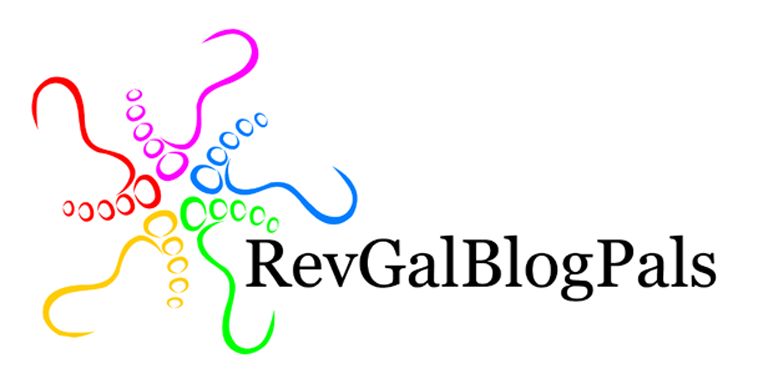As he walked along, he saw a man blind from birth. His disciples asked him, ‘Rabbi, who sinned, this man or his parents, that he was born blind?’ Jesus answered, ‘Neither this man nor his parents sinned; he was born blind so that God’s works might be revealed in him. We must work the works of him who sent me while it is day; night is coming when no one can work. As long as I am in the world, I am the light of the world.’ When he had said this, he spat on the ground and made mud with the saliva and spread the mud on the man’s eyes, saying to him, ‘Go, wash in the pool of Siloam’ (which means Sent). Then he went and washed and came back able to see. The neighbours and those who had seen him before as a beggar began to ask, ‘Is this not the man who used to sit and beg?’ Some were saying, ‘It is he.’ Others were saying, ‘No, but it is someone like him.’ He kept saying, ‘I am the man.’ But they kept asking him, ‘Then how were your eyes opened?’ He answered, ‘The man called Jesus made mud, spread it on my eyes, and said to me, “Go to Siloam and wash.” Then I went and washed and received my sight.’ They said to him, ‘Where is he?’ He said, ‘I do not know.’ 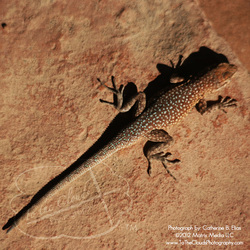 According to a blog about idioms, "This toast may have been popular with the soldiers slogging through the muddy trenches of WWI, but it did not originate with them, as many believe. Some say that back in the day the phrase symbolised a plentiful crop when farmers used to raise a glass to the success of a good harvest. It was being bandied about in U.S. saloons as early as 1890 and was popular with the English fox hunting and race horse crowd before then. According to Morten’s List, the roots are found in the Gospel of John (Chapter 9) where there’s mention of the medicinal qualities of "mud in the eye." It's true; clay has been used historically for anti-inflammatory treatment, as an antiseptic, as a way to save one's complexion and as treatment for a variety of intestinal problems. Medicinal clay is available in health food stores. It comes as a powder that can be made into a drink or added to a bath. Health spas offer mud baths and mud wraps. I've tried to put myself in this nameless, blind man's shoes for a day or two now. It could be a great comedy. Are you the man born blind? Yes. No, you can't be. Yes, it's me. But really, how can you see now? This man told me to put mud on my eyes and wash and now I see. Where are his parents? Let's ask them. - Yes, it's him. Then he wasn't born blind. Yes he was. Who are you? I'm the same man you're talking about. No, it can't be. And yet it is. Here I am. I was blind and now I see. I wonder what the man would be thinking during the conversation about whether Jesus is a sinner. I wonder because I think to myself... way to focus on the wrong thing folks! And so the man jumps back in and tries to keep the conversation on point. Listen, I don't know from sinner or not but doesn't it seem plausible that God might be involved since I CAN SEE NOW! And for that, they threw him out of the church. Excommunicated. I too could get derailed here. I could focus on the wrong part of the story. My mind wanders to the historical roots of this text and how "being thrown out of the synagogue" is at the heart of John's gospel. The in-fighting, the divisions, the factions in this community are palpable. I could get derailed from the miracle of the blind man receiving his site when I realize that this text has all kinds of timing issues. The story of the man who actually encountered Jesus would've happened long before the text was written. And the healing would've then happened long before anyone was being "thrown out of the community." And so I could focus on the historicity of the text and talk about how the writers of the gospels used stories to make their points way after the fact. (See Martyn or Raymond Brown) But then I too begin to hear the blind man saying to me - Hey, look. I can see now. Does it really matter if the gospels were written years after Jesus died. Does it really matter that this chapter helps prove the gospel texts are better classified as historical fiction? Can't you see? I can see now. I met this man and he told me to put mud on my eyes and then wash. And now I can see. 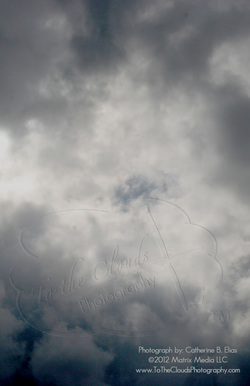 This man's story ends with Jesus having a candid conversation with him about belief. Jesus says to him, "I came into this world for judgement so that those who do not see may see, and those who do see may become blind." In the same way the Pharisees were taken aback by this judgment, it stops me in my tracks. Am I one of the ones who can see? Or am I one of the blind ones? What is it that I think I can "see" or understand? Where do I have clarity? And then where is this opposite true? Where is my confusion? my lack of understanding, my questions, my poor "sight?" Does my certainty cloud my vision? And does that kind of certainty qualify as "sin?" Because the passage begins wondering if this man sinned or if his parents sinned. And the Pharisees think Jesus is a sinner. A sinner - meaning one who misses the mark. I miss the mark all the time - and when I am so certain that I ignore or dismiss other ideas and other people, I have missed the mark. And with my new recognition of my own blindness, I sense the name man coming to stand beside me - with his fresh clarity. And when I get quiet, he says to me, "Here's mud in your eye." I can only hope.
2 Comments
Jesus said to them, ‘I am the bread of life. Whoever comes to me will never be hungry, and whoever believes in me will never be thirsty. But I said to you that you have seen me and yet do not believe. Everything that the Father gives me will come to me, and anyone who comes to me I will never drive away; for I have come down from heaven, not to do my own will, but the will of him who sent me. And this is the will of him who sent me, that I should lose nothing of all that he has given me, but raise it up on the last day. This is indeed the will of my Father, that all who see the Son and believe in him may have eternal life; and I will raise them up on the last day.’ Then the Jews began to complain about him because he said, ‘I am the bread that came down from heaven.’ They were saying, ‘Is not this Jesus, the son of Joseph, whose father and mother we know? How can he now say, “I have come down from heaven”?’ Jesus answered them, ‘Do not complain among yourselves. No one can come to me unless drawn by the Father who sent me; and I will raise that person up on the last day. It is written in the prophets, “And they shall all be taught by God.” Everyone who has heard and learned from the Father comes to me. Not that anyone has seen the Father except the one who is from God; he has seen the Father. Very truly, I tell you, whoever believes has eternal life. I am the bread of life. Your ancestors ate the manna in the wilderness, and they died. This is the bread that comes down from heaven, so that one may eat of it and not die. I am the living bread that came down from heaven. Whoever eats of this bread will live for ever; and the bread that I will give for the life of the world is my flesh.’ 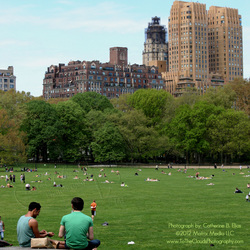 The Passover festival was near. Jesus and his disciples have just healed a crowd of people. And now Jesus wants to feed them as well. The resources at their disposal were one boy's lunch, five loaves and two fish. That story appears regularly on the preaching rotation. The lesson that takes place at the synagogue later however, does not. The reason for avoiding it is perhaps obvious. Eat my flesh; drink my blood. In a literal reading is barbaric. In an allegorical reading it is awkward. What is most important to me with this teaching passage is that it is John's version of our beloved sacrament, the Lord's Supper. This is it in John's gospel. There are no other words of institution at the Passover feast with his friends. Although there is a story about the Passover feast in John's gospel. If focuses on servant behavior with Jesus washing his disciple's feet. I'll be honest that every time I say the traditional words of institution, I feel a twinge of sadness that we leave John's community and perhaps their understanding of the Lord's Supper out of our understanding. Am I making too big of a deal? I don't think so. John's gospel was the last written and tremendous amounts of other doctrinal understanding comes from John's gospel. But his understanding of a shared meal and its meaning we have synchronized with the other gospels. What if the meal that we share once/month (that's how we do it at my church) was based on John's understanding alone? That would mean that the words of institution do not start with "on the night on which Jesus was betrayed..." What would words of institution sound like if they were in response to a miraculous feast followed by a lesson about the bread of life? What would those final words of invitation to the table sound like if not "every time we eat this bread and drink this cup we proclaim the saving death of our risen Lord until he comes again?" Because certainly the point that this feast in John is trying to make is not about proclaiming salvation in a time not yet but rather rejoicing in the living bread that has already come down from heaven. 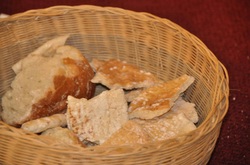 One of the gifts of the Narrative Lectionary I believe it to honor each gospel's unique flavor. This journey through John provides us an opportunity to put John's teachings in specific perspective. I've been dreaming about writing a prayer for the table that honors this passage, this understanding of the sacrament of the Lord's Table. How might our understanding of the table expand if we tried out some new language for the next few months each time we share the meal together? I want to find out. So here's my take on the the words of institution through John's understanding... After the miraculous feast on the mountainside where a multitude were satisfied with five loaves and two fish, the disciples gathered twelves baskets of left overs. (Instead of one loaf, a basket is filled with pieces of bread that is then lifted up) Jesus said to them, "I am the bread of life. Whoever comes to me will never be hungry. And whoever trusts in me will never be thirsty." (Pour the cup at this time.) Those gathered said this teaching is difficult. And so Jesus continued saying, "I am the bread that came down from heaven." When we come to this table together, we trust God will satisfy us our hunger (lift the basket) and our thirst (lift the cup). Jesus shared this meal with a hungry crowd long ago and he shares it with us today. Let us bring our hunger and our thirst to the table of the one who called himself the Living Bread.
 A member of my congregation died 34 hours ago after years of fighting cancer. Another member is in a rehab facility making miraculous progress after suffering a severe stroke. Both families share the same question, "How long?" A man has a dying son. Another man has been ill for 38 years. Both stories share the same question, "How long?" People are hurting. People are sick. People suffer - they suffer long. And although in the West we don't see miraculous healing that appear to be the ones represented in these texts, so many live with the question of "How long?" I could dig into the texts to find clarity about having faith or not having faith. I could review my understanding of systemic disease and the role that poverty plays in the health of our society. I could focus on the seven signs in the gospel of John. But I'd rather create an encounter with Jesus because that's what these two men had. An encounter. A father asked his question to a miracle worker. A man answers a question from a miracle worker. And they are forever changed after this encounter. As worship leaders we have the opportunity to create an encounter with the light of the world, the one who shines in the darkness, the one who knows everything about us - each week. Each Sunday, we craft worship services with hopes of creating encounters with Jesus. I wonder what kind of encounter we would have if we collectively joined our voices with the question on so many people's hearts, "How long?"  In our Sunday service, we want to create an encounter. We will use candle lighting rituals. We will use healing oils crafted from women from Thistle Farms, who have encountered healing themselves. We will sing. We will touch one another with the warmth of healing hands. We will pray. Perhaps Jesus will ask if we need signs in order to believe. Maybe the answer is yes. Perhaps Jesus will ask if we want to be well. Maybe the answer is not yet. Only the encounter will tell. |
Search this blog for a specific text or story:
I am grateful for
|

This work is licensed under a Creative Commons Attribution-NonCommercial-ShareAlike 3.0 Unported License.
